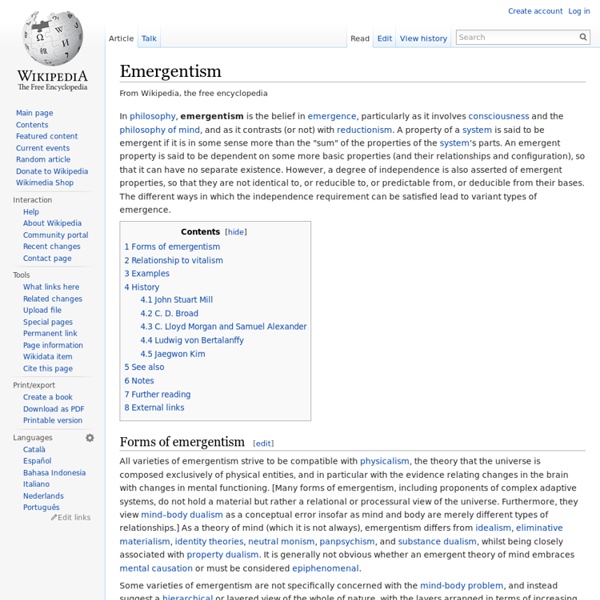Emergence
In philosophy, systems theory, science, and art, emergence is a process whereby larger entities, patterns, and regularities arise through interactions among smaller or simpler entities that themselves do not exhibit such properties. Emergence is central in theories of integrative levels and of complex systems. For instance, the phenomenon life as studied in biology is commonly perceived as an emergent property of interacting molecules as studied in chemistry, whose phenomena reflect interactions among elementary particles, modeled in particle physics, that at such higher mass—via substantial conglomeration—exhibit motion as modeled in gravitational physics. Neurobiological phenomena are often presumed to suffice as the underlying basis of psychological phenomena, whereby economic phenomena are in turn presumed to principally emerge. In philosophy, emergence typically refers to emergentism. In philosophy[edit] Main article: Emergentism Definitions[edit] Strong and weak emergence[edit]
Consciousness
Representation of consciousness from the seventeenth century At one time consciousness was viewed with skepticism by many scientists, but in recent years it has become a significant topic of research in psychology, neuropsychology and neuroscience. The primary focus is on understanding what it means biologically and psychologically for information to be present in consciousness—that is, on determining the neural and psychological correlates of consciousness. The majority of experimental studies assess consciousness by asking human subjects for a verbal report of their experiences (e.g., "tell me if you notice anything when I do this"). Issues of interest include phenomena such as subliminal perception, blindsight, denial of impairment, and altered states of consciousness produced by drugs and alcohol, or spiritual or meditative techniques. Etymology and early history[edit] John Locke, British philosopher active in the 17th century In the dictionary[edit] Philosophy of mind[edit]
Metacognition
Metacognition is defined as "cognition about cognition", or "knowing about knowing". It comes from the root word "meta", meaning beyond.[1] It can take many forms; it includes knowledge about when and how to use particular strategies for learning or for problem solving.[1] There are generally two components of metacognition: knowledge about cognition, and regulation of cognition.[2] Metamemory, defined as knowing about memory and mnemonic strategies, is an especially important form of metacognition.[3] Differences in metacognitive processing across cultures have not been widely studied, but could provide better outcomes in cross-cultural learning between teachers and students.[4] Some evolutionary psychologists hypothesize that metacognition is used as a survival tool, which would make metacognition the same across cultures.[4] Writings on metacognition can be traced back at least as far as De Anima and the Parva Naturalia of the Greek philosopher Aristotle.[5] Definitions[edit] [edit]
Phenomenology (science)
The term phenomenology in science is used to describe a body of knowledge that relates empirical observations of phenomena to each other, in a way that is consistent with fundamental theory, but is not directly derived from theory. For example, we find the following definition in the Concise Dictionary of Physics: Phenomenological Theory. A theory that expresses mathematically the results of observed phenomena without paying detailed attention to their fundamental significance.[1] The name is derived from phenomenon (Greek φαινόμενoν, pl. φαινόμενα - phenomena), which is any occurrence that is observable, and -λογία - -logia, translated as "study of" or "research". Jump up ^ Thewlis, J. (1973).
List of emotions
The contrasting and categorisation of emotions describes how emotions are thought to relate to each other. Various recent proposals of such groupings are described in the following sections. Contrasting basic emotions[edit] The following table,[1] based on a wide review of current theories, identifies and contrasts the fundamental emotions according to a set of definite criteria. The three key criteria used include mental experiences that: have a strongly motivating subjective quality like pleasure or pain;are in response to some event or object that is either real or imagined;motivate particular kinds of behaviour. The combination of these attributes distinguish the emotions from sensations, feelings and moods. HUMAINE's proposal for EARL (Emotion Annotation and Representation Language)[edit] The emotion annotation and representation language (EARL) proposed by the Human-Machine Interaction Network on Emotion (HUMAINE) classifies 48 emotions.[2] Parrott's emotions by groups[edit]
Peter Wessel Zapffe
Peter Wessel Zapffe (December 18, 1899 – October 12, 1990) was a Norwegian metaphysician, author and mountaineer. He was well known for his somewhat pessimistic view of human existence and his philosophy is considered to be an example of philosophical pessimism,[1] much like the work of the earlier philosopher Arthur Schopenhauer, by whom he was inspired. His thoughts regarding the error of human existence are presented in the essay "The Last Messiah" (original: Den sidste Messias, 1933). This essay is a shorter version of his best-known work, the philosophical treatise On the Tragic (original: Om det tragiske 1941). Contentions[edit] Zapffe's theory is that humans are born with an overdeveloped skill (understanding, self-knowledge) which does not fit into nature's design. In The Last Messiah Zapffe described four principal defense mechanisms that humankind uses to avoid facing this paradox: Zapffe was a prolific mountaineer and took a very early interest in environmentalism. Notes[edit]
Gum catalog
The Gum catalog is an astronomical catalog of 84 emission nebulae in the southern sky. It was made by the Australian astronomer Colin Stanley Gum (1924-1960) at Mount Stromlo Observatory using wide field photography. Gum published his findings in 1955 in a study entitled A study of diffuse southern H-alpha nebulae which presented a catalog of 84 nebulae or nebular complexes. Similar catalogs include the Sharpless catalog and the RCW catalog, and many of the Gum objects are repeated in these other catalogs. Examples[edit] Examples from the Gum Catalog (1955); click on image for image credit, most of which are either various amateur astronomers, the ESO, ESA, or NASA List[edit] References[edit] Sources[edit] External links[edit] Illustrated and annotated commentary of Gum objects See also[edit] RCW Catalogue



